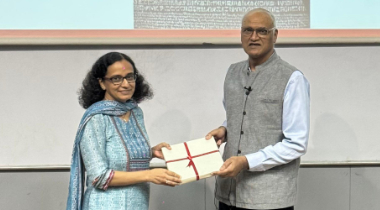
Events
NDMC Talk Series: Invited Talk by Dr. Rakesh Aggarwal, Professor of Gastroenterology, Sanjay Gandhi Postgraduate Institute of Medical Sciences
October 18, 2025
NDMC hosted a visit by Dr. Rakesh Aggarwal who delivered a talk on “Innumerate physicians and bio-blind mathematicians: Disease modelling needs the two to tango”
Dr. Aggarwal is currently Professor and Head, Department of Gastroenterology, Sanjay Gandhi Postgraduate Institute of Medical Sciences (SGPGI), Lucknow, where has been working in various capacities since 1990, except from January 2019 to December 2024, when he worked as Director at the Jawaharlal Institute of Postgraduate Medical Education and Research (JIPMER), Puducherry. Besides gastroenterology and hepatology, he has received formal training in epidemiology and laboratory work. He has worked extensively on epidemiologic, molecular, immunologic, clinical, and health economic aspects of viral hepatitis, with more than 350 published papers. His group’s work on health economics played a pivotal role in introduction of hepatitis B vaccine in India’s immunization programme in early 2000s and influenced hepatitis C treatment guidelines at the national as well as global level.
In the field of vaccine science, he has been a member of the WHO’s Strategic Advisory Group of Experts on Immunization (SAGE; 2017-2022), and chair of WHO SAGE’s working groups on human papillomavirus (HPV) vaccine, and on hepatitis A vaccine, and member of WHO SAGE’s working groups on influenza vaccines and on dengue virus vaccines. He currently chairs the WHO South-East Asia Region’s Regional Immunization Technical Advisory Group, and is a member of the WHO’s Immunization and Vaccines Related Implementation Research Advisory Committee (IVIR-AC) and WHO’s Global Advisory Committee on Vaccine Safety (GACVS). In addition, he is a member of India's National Technical Advisory Group of Immunization, and chair of its working groups on surveillance of vaccine preventable diseases, and on Japanese encephalitis vaccine.
Abstract
Mathematical modelling of infectious diseases uses mathematical equations to represent disease transmission, progression and outcomes, and helps inform public health policies by simulating disease outbreaks, forecasting changes in disease burden over time, assessing the impact of various public health interventions, such as contact tracing, vaccination programs, and drug treatment, and comparing their cost-effectiveness and budget impact. This technique permits a rapid comparison of various alternative interventions, whereas clinical trials to compare these often take years, delaying introduction of useful healthcare interventions, are costly, and may be unethical or impossible. While such models are routinely used to guide public health policy for controlling infectious diseases in several countries, their use in India has lagged.
Successful development of mathematical models requires experts who know biomedicine as well as mathematics and computer science. However, in India, educational streams for medicine and mathematics/computer science diverge early, resulting in ‘innumerate physicians’ and ‘bio-blind mathematicians’. Though efforts have been made to bring experts in these fields to work together, the modelling output has been mixed. There are two major reasons for this.
First, it is often thought that principles underlying mathematical models, such as deterministic compartmental models, Markov chains, are similar across various diseases. However, infectious disease biology is more complex than that, and with each individual disease/pathogen possessing certain inherent biological characteristics, that necessitate the use of more complex and specific models.
Second, each model needs to be calibrated and/or validated using high-quality epidemiological data, which are often not available in our setting.
The speaker has extensive experience in the fields of infectious diseases, vaccination and healthcare economic analyses. Though not a modeler himself, he has been involved in interpretation and use of modelling data for deciding health policy. Besides presenting his work on economic analyses in relation to viral hepatitis, he will use various diseases to exemplify the complexities involved in disease modelling. He will argue that, for mathematical modelling to flourish, a sustained interaction between experts in mathematics and in individual disease domains to cross-learn the peculiarities of biology of specific diseases and principles of mathematics, respectively, is mandatory.
Dr. Rakesh Aggarwal also interacted with the various modelling groups of NDMC and provided valuable insights.
